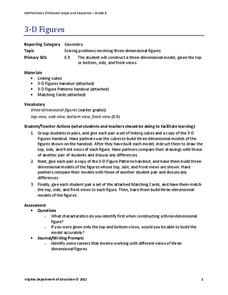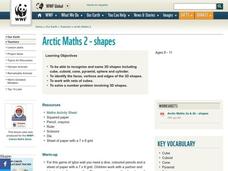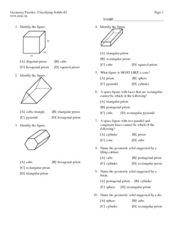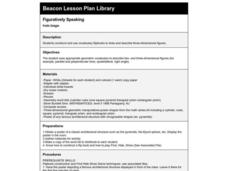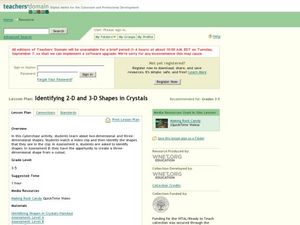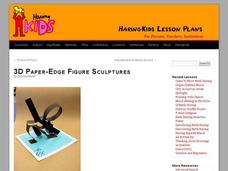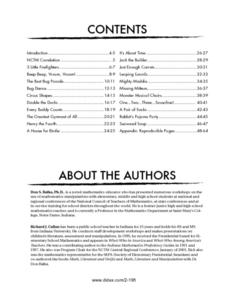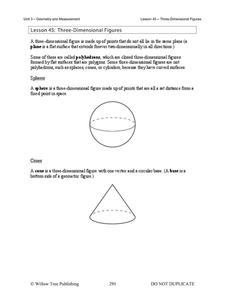Illustrative Mathematics
3-D Shape Sort
From the apple on your desk and the coffee cup in your hand, to the cabinets along the classroom wall, basic three-dimensional shapes are found everywhere in the world around us. Introduce young mathematicians to the these common figures...
Virginia Department of Education
3-D Figures
Scholars construct three-dimensional figures to study dimension and side views. Learners build models using linking cubes to match views of different sides. After practicing with models, they attempt to match three-dimensional drawings...
World Wildlife Fund
Shapes
Investigate the properties of three-dimensional figures with this Arctic-themed math lesson. Beginning with a class discussion about different types of solid figures present in the classroom, young mathematicians are then given a...
Willow Tree
Surface Area of Three-Dimensional Figures
Lateral area and surface area are simple concepts, but calculating them is not as easy! Using formulas, learners calculate lateral area and surface area for the same three-dimensional figures. The resource discusses the formula variables...
Curated OER
Geometry Practice: Classifying Solids #2
In this solids worksheet, students identify the characteristics of solids. They name solids and determine the number of faces. This three-page worksheet contains seventeen problems. Answers are listed on the last page.
Curated OER
Classifying Three-Dimensional Shapes
Compare geometric solids based on their properties. Your emergent geometers use spaghetti and marshmallows to build models so they can examine the number of faces, edges, and vertices on polyhedra of their own creation. Resource includes...
Curated OER
Figuratively Speaking
Third graders construct and use vocabulary flipbooks to draw and describe three-dimensional figures. They utilize worksheets and access websites imbedded in this plan which help them construct their books.
Utah Education Network (UEN)
Geo Shapes
Invite your first graders to compose and decompose two and three-dimensional figures with this fun, hands-on lesson. They investigate and predict the results of putting together and taking apart two-dimensional shapes with rubber bands...
Curated OER
Identifying 2-D and 3-D Shapes in Crystals
Students view a video on making rock candy and identify the shapes they see while watching. In this 2 and 3 dimensional shape lesson plan, students recognize shapes and complete worksheets to identify them. Students build a cube....
Curated OER
Three-Dimensional Play Dough
Fourth graders make models of three-dimensional figures and then use these play dough figures to observe and count the vertices, edges, and faces of the figure.
Curated OER
Three-Dimensional Objects
Fourth graders view and identify three-dimensional figures. They analyze and discuss various figures, build three-dimensional figures, and complete various worksheets and worksheet discussion questions.
Curated OER
3D Paper-Edge Figure Sculptures
Young scholars discover visual arts by creating sculptures in class. In this personal expression lesson, students research the Internet and examine different examples of modern sculptures and 3 dimensional art. Young scholars utilize...
Curated OER
3-D Figures Part 1
Elementary schoolers explore 3-D shapes. They transition from thinking of shapes as only 2-D. Pupils read Cinderella as a launching activity for their upcoming adventure, and explore a new world of 3-D shapes in this introductory lesson.
Curated OER
Math-Literature Connection: Counting with Jack the Builder
Connect literature (Jack the Builder) with mathematical concepts. In a series of computation, geometry and number sense activities, pupils count on to add, count back to subtract, build cylinders, cones, and rectangular prisms, and name...
Curated OER
Living in a Geometrical World
Students participate in a series of hand-on, online, and multimedia activities to examine 2 dimensional and 3 dimensional shapes. They describe common geometric solids. They construct rectangular prisms using straws and ribbon.
EngageNY
Composition of Linear Transformations 2
Scholars take transformations from the second to the third dimension as they extend their thinking of transformations to include three-dimensional figures. They explore how to use matrices to represent compositions of...
Curated OER
Great Shapes Alive!
Compare two- and three-dimensional shapes and construct three dimensional models from two-dimensional shapes. Diagram the shapes and reflect about the process in writing.
Curated OER
Edible Geometry
Students examine a chart that lists the main characteristics of polygons and 3 dimensional figures. They make examples of the polygons and figures using pretzels and gum drops showing how the gum drops are vertices and the pretzels are...
Willow Tree
Three-Dimensional Figures
Time to move into the third dimension! Learn the names of the geometric solids and count faces, edges, and vertices. Then learn to recognize nets that create a given solid.
Pennsylvania Department of Education
Shapes Around Us
Learners use manipulatives to study shapes. They sort shapes and use correct geometric terminology to describe them. Students find real-life examples of 2 and 3 dimensional shapes, and classify figures in their classroom according to...
Curated OER
Pyramids and Prisms: Guler's Formula
Sixth graders detect and categorize the attributes of geometric shapes to solve problems. In this geometry lesson, 6th graders construct a variety of polyhedra. Students recognize the relationships between two dimensional and three...
Curated OER
Dihedral Figures
Middle and high schoolers perform transformations. In this web based lesson, students explore dihedral figures. They use the web tools to translate, rotate, and reflect figures. Pupils identify lines of symmetry.
Curated OER
Eye-Popping Op Art
Students examine and discuss work of Hungarian artist Victor Vasarely, recognize visual components of Op Art, compare traditional Renaissance perspective with Op Art's illusion of three-dimensional space, and create original painting...
Utah Education Network (UEN)
Insides and Outsides
Give small groups handfuls of unit cubes and then dare them to build as many rectangular prisms as possible using only 12 cubes. This engaging activity serves as an introduction to the volume of solid figures. In addition to volume,...

